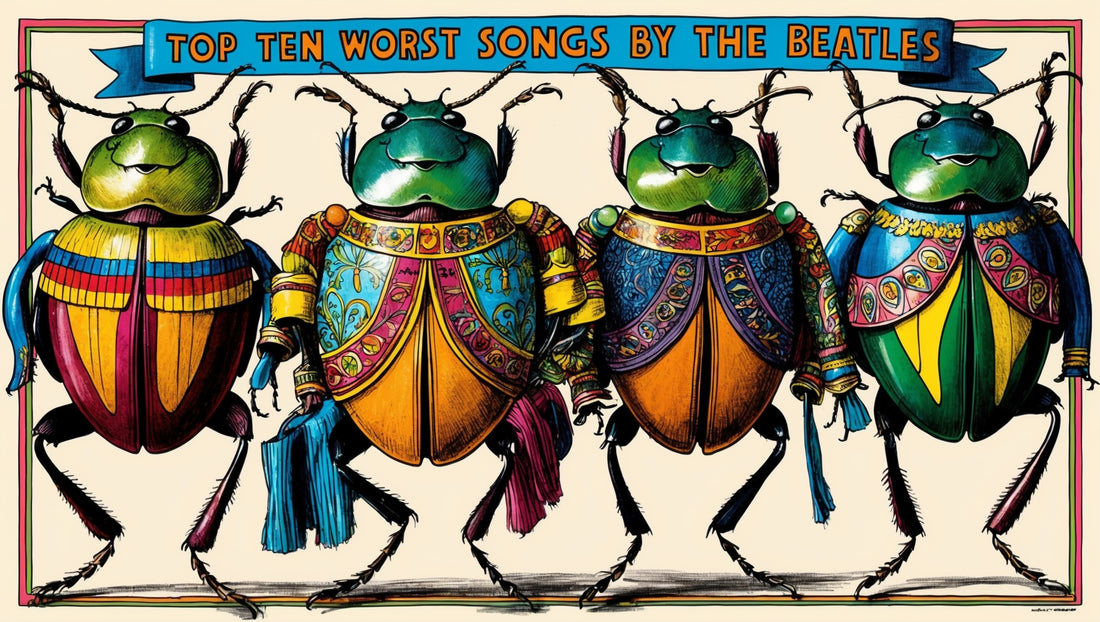The Beatles, a rock band often believed to be the greatest of all time, had their share of hits... along with some which weren't so great. While their discography includes timeless classics, there are a few tracks that have drawn criticism over the years. Here are ten Beatles songs that, for various reasons, have been considered less than stellar by fans and critics alike.
-
"Revolution 9" (1968)
- An avant-garde sound collage from the "White Album," "Revolution 9" is a polarizing piece. Its abstract nature, featuring various sound effects and spoken word segments, is often criticized for being inaccessible and lacking the musicality typical of The Beatles. Fans are divided, with some appreciating its experimental approach, while others find it jarring and incoherent.
-
"Mr. Moonlight" (1964)
- This cover song from the album "Beatles for Sale" is often considered a low point due to its lackluster arrangement and vocal performance. Compared to The Beatles' original material, "Mr. Moonlight" feels uninspired and out of place. The organ solo, in particular, has been a target for criticism, with many feeling it detracts from the song rather than adding to it.
-
"Wild Honey Pie" (1968)
- A brief and experimental track from the "White Album," "Wild Honey Pie" is frequently viewed as filler. Its repetitive and whimsical nature can be grating, making it one of the more skippable tracks in The Beatles' catalog. Some fans appreciate its quirky charm, but many consider it a throwaway piece that disrupts the album's flow.
-
"You Know My Name (Look Up the Number)" (1970)
- Released as the B-side to "Let It Be," this novelty song is characterized by its humorous and nonsensical approach. While it showcases The Beatles' playful side, many fans find it lacks the depth and sophistication of their more serious works. The track's length and seemingly aimless structure contribute to its reputation as one of their weaker efforts.
-
"Maxwell's Silver Hammer" (1969)
- From the "Abbey Road" album, this song is often criticized for its jaunty, music-hall style juxtaposed with darkly humorous lyrics about murder. Some listeners feel it disrupts the album's flow and comes across as overly whimsical. Despite its catchy melody, "Maxwell's Silver Hammer" is seen by some as a misstep in an otherwise groundbreaking album.
-
"Run for Your Life" (1965)
- Closing the "Rubber Soul" album, "Run for Your Life" is controversial due to its aggressive lyrics about jealousy and control. John Lennon himself later expressed regret over the song, adding to its notoriety. The disturbing nature of the lyrics contrasts sharply with the more progressive and reflective themes present in the rest of the album.
-
"Blue Jay Way" (1967)
- A George Harrison composition from the "Magical Mystery Tour," "Blue Jay Way" is often seen as one of his weaker efforts. Its droning melody and repetitive lyrics can feel monotonous, lacking the vibrancy of other Beatles tracks. While it attempts to create a psychedelic atmosphere, many feel it falls short in execution.
-
"Ob-La-Di, Ob-La-Da" (1968)
- This upbeat, ska-influenced song from the "White Album" divides listeners. While some enjoy its catchy, carefree vibe, others find it overly simplistic and repetitive, dubbing it one of the less substantial songs in their catalog. The song's poppy and light-hearted nature can feel out of place amidst the more complex and experimental tracks on the album.
-
"Only a Northern Song" (1969)
- Originally recorded during the "Sgt. Pepper's" sessions and later included on the "Yellow Submarine" soundtrack, this Harrison song is often criticized for its dissonant arrangement and self-referential lyrics, which some feel lack the polish of other Beatles tunes. It stands out as a less cohesive and somewhat jumbled effort in their otherwise illustrious catalog.
-
"Dig It" (1970)
- A brief, improvised jam from the "Let It Be" sessions, "Dig It" is viewed by many as an unfocused filler track. Its spontaneous nature may hold some charm, but it lacks the structure and depth found in The Beatles' more polished songs. The song's inclusion on the album has puzzled fans who feel it detracts from the overall quality of the record.
These songs, while part of The Beatles' legendary discography, serve as reminders that even the greatest bands can have their missteps. The diversity of their catalog ensures that every listener can find both favorites and not-so-favorites among their extensive body of work.
















